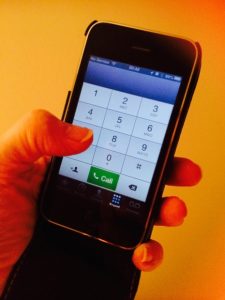Police and other law enforcement officers are increasingly asking people to turn over their cell phones, whether in the course of a traffic stop, after a motor vehicle collision or in the course of investigating the crime. A record number of people in America now have smartphones – nearly 80 percent according to Pew Research Center, which further noted among 18-to-29-olds, smart phone ownership exceeded 92 percent.
It should be obvious why investigators want to get their hands on these devices: They are a treasure trove of information and can make their jobs a whole lot easier. It’s hard to imagine even just a few short years ago, cell phones were solely verbal and texting communication devices. Now, they contain scores of sensitive and personal information, including calendars, emails, personal and professional contacts, music files, verification of recent purchases, bank records, public social media engagement (including personal messages) work files, browser history of recent websites and of course saved photos and videos. This is not information you want – or usually that they never need – to see.
As Fort Lauderdale criminal defense attorneys at The Ansara Law Firm can explain, the 4th Amendment to  the U.S. Constitution protects people from unreasonable searches and seizures. There are numerous reasons why cell phone information should remain private – not the least of which for a potential defendant is the fact that it could give police and prosecutors key evidence against you. But even if you have nothing to hide, it’s generally unwise to simply hand your phone over on request. Plus – you aren’t required to do so unless the officer has a warrant.
the U.S. Constitution protects people from unreasonable searches and seizures. There are numerous reasons why cell phone information should remain private – not the least of which for a potential defendant is the fact that it could give police and prosecutors key evidence against you. But even if you have nothing to hide, it’s generally unwise to simply hand your phone over on request. Plus – you aren’t required to do so unless the officer has a warrant.
The U.S. Supreme Court ruled unanimously in 2014 that police must obtain warrants before seizing your cell phone and rifling through its contents. To search a cell phone with neither consent nor a warrant, justices ruled, is no different than digging through one’s pockets. They reasoned the fact that technology allows this information to be carried in his/ her hand doesn’t make that information somehow less worthy of 4th Amendment protection. A Florida appellate court in 2016 cited this precedent.
But this doesn’t mean all cell phone evidence gleaned without a warrant is inadmissible. There is a loophole: Consent. If you agree to simply hand over your phone to an officer because he or she asks, you don’t have the right to later challenge a violation of your rights. You voluntarily consented to the search.
Voluntary consent has been the subject of numerous criminal cases. In order for consent to be “voluntary,” the U.S. Supreme Court held has held prosecutors bear the proof burden to show defendant gave consent, was not coerced and was aware he/ she had a choice. Somewhat confusingly, your “awareness of choice” doesn’t mean police must tell you of your right to refuse. In some cases, they can even outright deceive you (though they can’t tell you they have a warrant when they really don’t, as held in the 1968 U.S. Supreme Court case of Bumper v. North Carolina).
Voluntary consent can be challenged in a motion to suppress (and/or appeal), but it’s better to avoid it altogether if you can by politely – but firmly – declining to hand over your phone unless they hand you a warrant.
While we’re on the subject of cell phone technology, just last month, the U.S. Supreme Court ruled that police also usually need a warrant to use something spyware, which allows investigators to track someone’s past movements based on their cell phone coordinates. Both the Obama and Trump administrations had argued a warrant wasn’t necessary because this information is voluntarily given by the customer to the phone company. Chief Justice John Roberts ruled the realities of modern life make that notion too simple an explanation. Specifically, people have their phones with them all the time – in their homes, doctors’ offices, political headquarters and other locations that could be revealing and also an invasion of privacy. Roberts compared this type of surveillance as akin to placing an ankle monitor on the user of that phone.
Call Fort Lauderdale Criminal Defense Attorney Richard Ansara at (954) 761-4011. Serving Broward, Miami-Dade and Palm Beach counties.
Additional Resources:
Consent Searches, Justia
More Blog Entries:
Interviewing Suspect Absent Defense Lawyer Results in Tossed Conviction, July 30, 2018, Fort Lauderdale Criminal Defense Attorney Blog
 Fort Lauderdale Criminal Attorney Blog
Fort Lauderdale Criminal Attorney Blog


